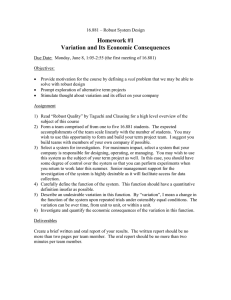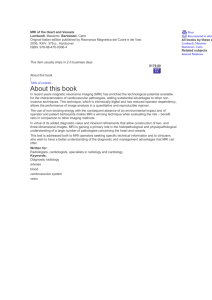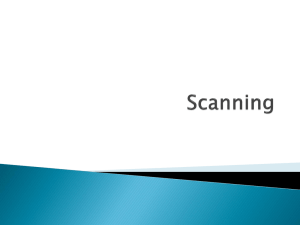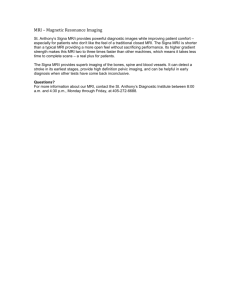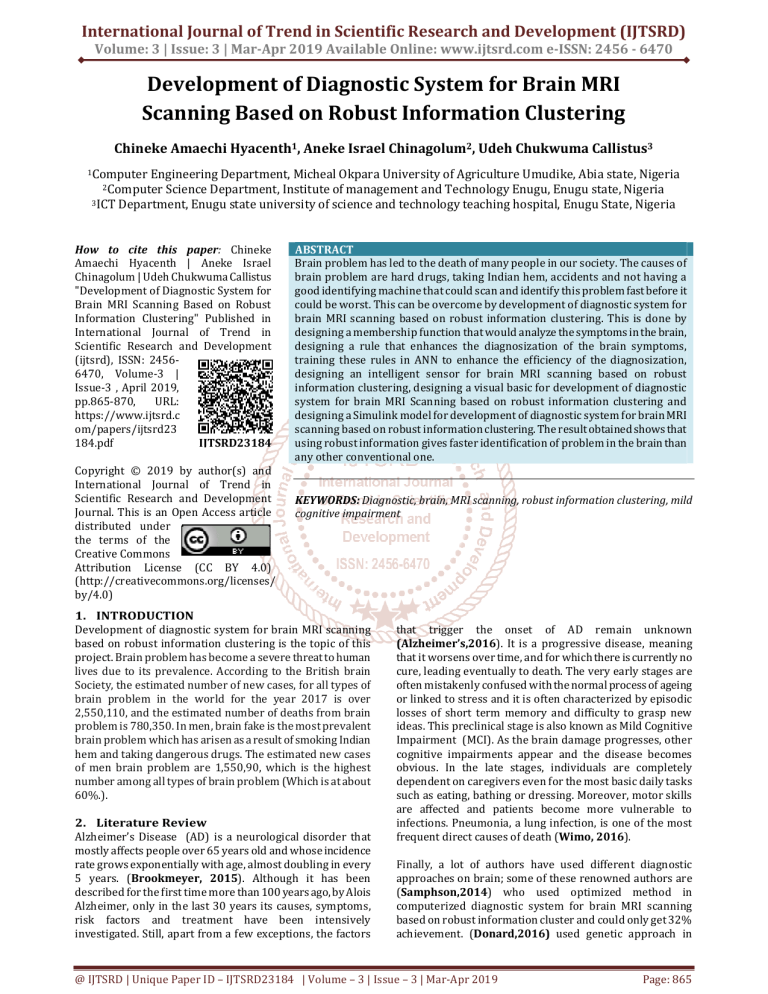
International Journal of Trend in Scientific Research and Development (IJTSRD)
Volume: 3 | Issue: 3 | Mar-Apr 2019 Available Online: www.ijtsrd.com e-ISSN: 2456 - 6470
Development of Diagnostic System for Brain MRI
Scanning Based on Robust Information Clustering
Chineke Amaechi Hyacenth1, Aneke Israel Chinagolum2, Udeh Chukwuma Callistus3
1Computer
Engineering Department, Micheal Okpara University of Agriculture Umudike, Abia state, Nigeria
Science Department, Institute of management and Technology Enugu, Enugu state, Nigeria
3ICT Department, Enugu state university of science and technology teaching hospital, Enugu State, Nigeria
2Computer
How to cite this paper: Chineke
Amaechi Hyacenth | Aneke Israel
Chinagolum | Udeh Chukwuma Callistus
"Development of Diagnostic System for
Brain MRI Scanning Based on Robust
Information Clustering" Published in
International Journal of Trend in
Scientific Research and Development
(ijtsrd), ISSN: 24566470, Volume-3 |
Issue-3 , April 2019,
pp.865-870,
URL:
https://www.ijtsrd.c
om/papers/ijtsrd23
184.pdf
IJTSRD23184
Copyright © 2019 by author(s) and
International Journal of Trend in
Scientific Research and Development
Journal. This is an Open Access article
distributed under
the terms of the
Creative Commons
Attribution License (CC BY 4.0)
(http://creativecommons.org/licenses/
by/4.0)
ABSTRACT
Brain problem has led to the death of many people in our society. The causes of
brain problem are hard drugs, taking Indian hem, accidents and not having a
good identifying machine that could scan and identify this problem fast before it
could be worst. This can be overcome by development of diagnostic system for
brain MRI scanning based on robust information clustering. This is done by
designing a membership function that would analyze the symptoms in the brain,
designing a rule that enhances the diagnosization of the brain symptoms,
training these rules in ANN to enhance the efficiency of the diagnosization,
designing an intelligent sensor for brain MRI scanning based on robust
information clustering, designing a visual basic for development of diagnostic
system for brain MRI Scanning based on robust information clustering and
designing a Simulink model for development of diagnostic system for brain MRI
scanning based on robust information clustering. The result obtained shows that
using robust information gives faster identification of problem in the brain than
any other conventional one.
KEYWORDS: Diagnostic, brain, MRI scanning, robust information clustering, mild
cognitive impairment
1. INTRODUCTION
Development of diagnostic system for brain MRI scanning
based on robust information clustering is the topic of this
project. Brain problem has become a severe threat to human
lives due to its prevalence. According to the British brain
Society, the estimated number of new cases, for all types of
brain problem in the world for the year 2017 is over
2,550,110, and the estimated number of deaths from brain
problem is 780,350. In men, brain fake is the most prevalent
brain problem which has arisen as a result of smoking Indian
hem and taking dangerous drugs. The estimated new cases
of men brain problem are 1,550,90, which is the highest
number among all types of brain problem (Which is at about
60%.).
2. Literature Review
Alzheimer’s Disease (AD) is a neurological disorder that
mostly affects people over 65 years old and whose incidence
rate grows exponentially with age, almost doubling in every
5 years. (Brookmeyer, 2015). Although it has been
described for the first time more than 100 years ago, by Alois
Alzheimer, only in the last 30 years its causes, symptoms,
risk factors and treatment have been intensively
investigated. Still, apart from a few exceptions, the factors
that trigger the onset of AD remain unknown
(Alzheimer’s,2016). It is a progressive disease, meaning
that it worsens over time, and for which there is currently no
cure, leading eventually to death. The very early stages are
often mistakenly confused with the normal process of ageing
or linked to stress and it is often characterized by episodic
losses of short term memory and difficulty to grasp new
ideas. This preclinical stage is also known as Mild Cognitive
Impairment (MCI). As the brain damage progresses, other
cognitive impairments appear and the disease becomes
obvious. In the late stages, individuals are completely
dependent on caregivers even for the most basic daily tasks
such as eating, bathing or dressing. Moreover, motor skills
are affected and patients become more vulnerable to
infections. Pneumonia, a lung infection, is one of the most
frequent direct causes of death (Wimo, 2016).
Finally, a lot of authors have used different diagnostic
approaches on brain; some of these renowned authors are
(Samphson,2014) who used optimized method in
computerized diagnostic system for brain MRI scanning
based on robust information cluster and could only get 32%
achievement. (Donard,2016) used genetic approach in
@ IJTSRD | Unique Paper ID – IJTSRD23184 | Volume – 3 | Issue – 3 | Mar-Apr 2019
Page: 865
International Journal of Trend in Scientific Research and Development (IJTSRD) @ www.ijtsrd.com eISSN: 2456-6470
computerized diagnostic system for brain MRI scanning
based on robust information cluster and achieved at about
41% efficiency. (Leo, 2015) used proportional integral in
the same diagnostic system but could only achieve 38%. This
inefficiency in the diagnostic approach has led to the death of
many innocent Nigerians. This ugly situation that has led to
the death of some Nigerians can be overcome by
development of diagnostic system for brain MRI scanning
based on robust information clustering using intelligent
agent.
3. Methodology
To design a membership function that would analyze the symptoms in the brain
Fig 1 designed membership function that would analyze the symptoms in the brain
Fig 1 shows designed membership function that would analyze the symptoms in the brain. Fig 1 analysis the types of symptoms
in the brain.
To design a rule that enhances the diagnosization of the brain symptoms
Fig 2 designed rule that enhances the diagnosization of the brain symptoms
Fig 2 shows designed rules that enhance the diagnosization of the brain symptoms. It helps in the identification of the causes of
brain problems.
To train these rules in ANN to enhance the efficiency of the diagnosization
Fig 3 trained rules in ANN to enhance the efficiency of the diagnosization
Fig 3 shows trained rules in ANN to enhance the efficiency of the diagnosization. It is trained to stick strictly to the fast
identification of brain symptoms at a lower rate.
@ IJTSRD | Unique Paper ID - IJTSRD23184 | Volume – 3 | Issue – 3 | Mar-Apr 2019
Page: 866
International Journal of Trend in Scientific Research and Development (IJTSRD) @ www.ijtsrd.com eISSN: 2456-6470
To design an intelligent sensor for brain MRI scanning based on robust information clustering.
Fig 4 designed intelligent sensor for brain MRI scanning based on robust information clustering
Fig 4 shows designed intelligent sensor for brain MRI scanning based on robust information clustering.
Fig 4 also shows that when the sensor indicates green light, it shows that no brain symptom is observed by the sensor.
To design a visual basic development of diagnostic system for brain MRI Scanning based on robust information
clustering
Fig 5 designed visual basic development of diagnostic system for brain MRI Scanning based on robust information
clustering
Fig 5 shows designed visual basic development of diagnostic system for brain MRI scanning based on robust information
clustering. Fig 5 shows the processing of the brain scanning of an accident victim. Fig 5 also shows green light indicator when it
is still in the processing stage.
Fig 6 designed visual basic development of diagnostic system for brain MRI Scanning based on robust information
clustering
@ IJTSRD | Unique Paper ID - IJTSRD23184 | Volume – 3 | Issue – 3 | Mar-Apr 2019
Page: 867
International Journal of Trend in Scientific Research and Development (IJTSRD) @ www.ijtsrd.com eISSN: 2456-6470
Fig 6 shows designed visual basic development of diagnostic system for brain MRI scanning based on robust information
clustering when the machine has identified some wound in the accident victim and the points of its locations.
To design a Simulink model for development diagnostic system for brain MRI scanning without robust information
clustering
Fig 7 designed Simulink model for development diagnostic system for brain MRI scanning without robust information
clustering.
Fig 7 shows designed Simulink model for development diagnostic system for brain MRI scanning without robust information
clustering. Table 1 shows the simulated result obtained in designed Simulink model for development diagnostic system for
brain MRI scanning without robust information.
To design a Simulink model for development diagnostic system for brain MRI scanning based on robust information
clustering
Fig 8 designed Simulink model for development diagnostic system for brain MRI scanning based on robust information
clustering
Fig 8 shows designed Simulink model for development diagnostic system for brain MRI scanning based on robust information
clustering. Table 2 shows the simulated result gotten when robust information clustering is incorporated in the system.
4. Result and Analysis
Table 1 RATE OF BRAIN IDENTIFICATION WITHOUT INTELLIGENT AGENT
RATE OF BRAIN IDENTIFICATION
TIME(S)
WITHOUT INTELLIGENT AGENT
40
1
80
2
120
3
160
4
200
5
240
6
@ IJTSRD | Unique Paper ID - IJTSRD23184 | Volume – 3 | Issue – 3 | Mar-Apr 2019
Page: 868
International Journal of Trend in Scientific Research and Development (IJTSRD) @ www.ijtsrd.com eISSN: 2456-6470
Fig 9 rate of brain identification without robust information (intelligent agent)
Fig 9 shows rate of brain identification without robust information (intelligent agent). The highest rate of identification verse
time of its identification is (240,6) while its least of rate of identification verse time occurred at (40,1).
Table 2 Rate of brain identification with intelligent agent
RATE OF BRAIN IDENTIFICATION
TIME(S)
WITH INTELLIGENT AGENT
30.1
1
60.21
2
90.31
3
120.4
4
150.5
5
180.6
6
Fig 10 rate of brain identification with robust information (intelligent agent)
Fig 10 shows rate of brain identification with robust information (intelligent agent). Fig 10 shows that the highest rate of
identification verse time of its identification occurred at (180.6, 6) while the least occurred at (50.1, 1).
Table 3 comparing rate of brain identification with and without intelligent agent
RATE OF BRAIN IDENTIFICATION
RATE OF BRAIN IDENTIFICATION
TIME(S)
WITHOUT INTELLIGENT AGENT
WITH INTELLIGENT AGENT
40
30.1
1
80
60.21
2
120
90.31
3
160
120.4
4
200
150.5
5
240
180.6
6
@ IJTSRD | Unique Paper ID - IJTSRD23184 | Volume – 3 | Issue – 3 | Mar-Apr 2019
Page: 869
International Journal of Trend in Scientific Research and Development (IJTSRD) @ www.ijtsrd.com eISSN: 2456-6470
Fig 11 comparing rate of brain identification with and without intelligent agent
Fig 11 shows comparing rate of brain identification with and without robust information (intelligent agent). The result
obtained shows that the highest rate of identification verse time when robust information is used is (180.6, 6) while the result
obtained when it is not used is (240, 6). With this result obtained using robust information identifies brain problem faster than
when robust information is not used.
5. Conclusion
The not identifying brain problem at a faster rate has led to
the dying of some innocent souls in our country Nigeria. This
unfortunate incidence can be overcome by development of
diagnostic system for brain MRI scanning based on robust
information clustering. This is done by designing a
membership function that would analyze the symptoms in
the brain, designing a rule that enhances the diagnosization
of the brain symptoms, training these rules in ANN to
enhance the efficiency of the diagnosization, designing an
intelligent sensor for brain MRI scanning based on robust
information clustering, designing a visual basic for
development of diagnostic system for brain MRI Scanning
based on robust information clustering and designing a
Simulink model for development of diagnostic system for
brain MRI scanning based on robust information cluster
References
[1] Alzheimer’s J, Factors that trigger the onset of
Alzheimer’s Disease AD rem 2 016)
[2] Brookmeyer, S. Gray, and C. Kawas, “Projections of
Alzheimer’s disease in the United States and the public
health impact of delaying disease onset,” American
Journal of Public Health 2015 vol. 88, no. 9, pp. 1337–
1342, 1998.
[3] A. Association, “2012 Alzheimer’s disease facts and
figures,” Alzheimer’s and Dementia: The Journal of the
Alzheimer’s Association, vol. 8, no. 2, pp. 131–168,
2012.
[4] C. P. Ferri, R. Sousa, E. Albanense, W. s. Ribeiro, and M.
Honyashiki, “World Alzheimer Report 2009,” 2009.
[5] Donard D information technology on clustering,2016)
[6] Samphson y Diagnostic approach on brain ,2014)
[7] LeoMRI scanning based on robust information
cluste,2015)
[8] Wimo and M. Prince, “World Alzheimer Report 2010:
The global economic impact of dementia,” September
2016
@ IJTSRD | Unique Paper ID - IJTSRD23184 | Volume – 3 | Issue – 3 | Mar-Apr 2019
Page: 870

